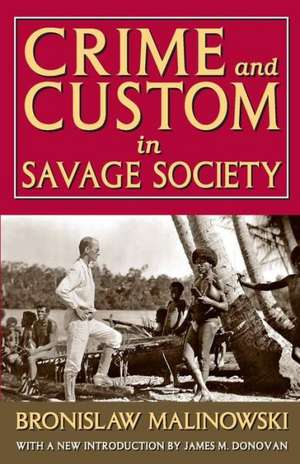Crime and Custom in Savage Society
Autor Russell Smith, Bronislaw Malinowskien Limba Engleză Paperback – 30 apr 2013
Malinowski's choice of law was not inevitable, but neither was it unmotivated. Anyone interested in understanding the social structure and organization of societies cannot avoid dealing with the concept of "law," even if it is to deny its presence. Law and anthropology have shown a natural affinity for one another, sharing a beneficial history of using the methods and viewpoints of one to inform and advance the other.
The best lesson Malinowski provides us with comes in the last paragraphs of Crime and Custom in Savage Society: "The true problem is not to study how human life submits to rules; the real problem is how the rules become adapted to life." On that question, he has left us richly inspired to continue the quest.
| Toate formatele și edițiile | Preț | Express |
|---|---|---|
| Paperback (1) | 425.03 lei 6-8 săpt. | |
| Taylor & Francis – 30 apr 2013 | 425.03 lei 6-8 săpt. | |
| Hardback (1) | 1109.18 lei 6-8 săpt. | |
| Taylor & Francis – 6 oct 2017 | 1109.18 lei 6-8 săpt. |
Preț: 425.03 lei
Nou
Puncte Express: 638
Preț estimativ în valută:
81.33€ • 85.14$ • 67.29£
81.33€ • 85.14$ • 67.29£
Carte tipărită la comandă
Livrare economică 05-19 aprilie
Preluare comenzi: 021 569.72.76
Specificații
ISBN-13: 9781412849784
ISBN-10: 1412849780
Pagini: 158
Dimensiuni: 138 x 216 x 9 mm
Greutate: 0.19 kg
Ediția:1
Editura: Taylor & Francis
Colecția Routledge
Locul publicării:Oxford, United Kingdom
ISBN-10: 1412849780
Pagini: 158
Dimensiuni: 138 x 216 x 9 mm
Greutate: 0.19 kg
Ediția:1
Editura: Taylor & Francis
Colecția Routledge
Locul publicării:Oxford, United Kingdom
Cuprins
Preface Introduction to the Transaction Edition Introduction PART I.Primitive Law and Order 1The Automatic Submission to Custom and the Real Problem 2Melanesian Economics and the Theory of Primitive Communism 3The Binding Force of Economic Obligations 4Reciprocity and Dual Organization 5Law, Self-interest, and Social Ambition 6The Rules of Law in Religious Acts 7The Law of Marriage 8The Principle of Give-and-take Pervading Tribal Life
Notă biografică
Russell Smith, Bronislaw Malinowski
Descriere
Crime and Custom in Savage Society represents Bronislaw Malinowski's major discussion of the relationship between law and society. Throughout his career he constructed a coherent science of anthropology, one modeled on the highest standards of practice and theory. Methodology steps forward as a core element of the refashioned anthropology, one that stipulates the manner in which anthropological data should be acquired.
Malinowski's choice of law was not inevitable, but neither was it unmotivated. Anyone interested in understanding the social structure and organization of societies cannot avoid dealing with the concept of "law," even if it is to deny its presence. Law and anthropology have shown a natural affinity for one another, sharing a beneficial history of using the methods and viewpoints of one to inform and advance the other.
The best lesson Malinowski provides us with comes in the last paragraphs of Crime and Custom in Savage Society: "The true problem is not to study how human life submits to rules; the real problem is how the rules become adapted to life." On that question, he has left us richly inspired to continue the quest.
Malinowski's choice of law was not inevitable, but neither was it unmotivated. Anyone interested in understanding the social structure and organization of societies cannot avoid dealing with the concept of "law," even if it is to deny its presence. Law and anthropology have shown a natural affinity for one another, sharing a beneficial history of using the methods and viewpoints of one to inform and advance the other.
The best lesson Malinowski provides us with comes in the last paragraphs of Crime and Custom in Savage Society: "The true problem is not to study how human life submits to rules; the real problem is how the rules become adapted to life." On that question, he has left us richly inspired to continue the quest.
